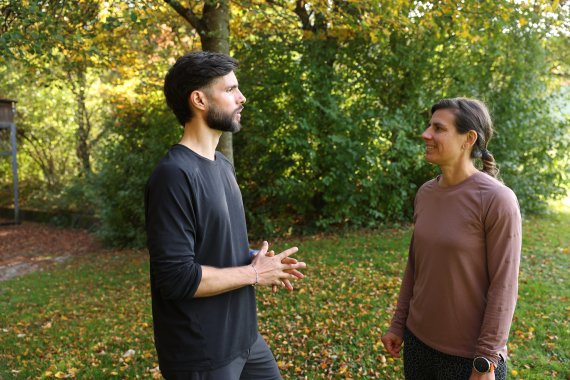- How did your journey lead to the creation of Active Giving?
- How does Active Giving turn physical activities into environmental impact?
- How do you ensure brands' commitment and the effectiveness of their contributions?
- How can brands authentically engage in sustainability and steer clear of greenwashing?
- How important is community building for brands in sustainability?
- Could you share an example of how Active Giving has influenced a community or partner brand?
- How can companies improve sustainability and avoid greenwashing?
- How do you see the role of sports in promoting sustainability evolving?
Absolutely. My passion for sports started early in life but truly took shape in my 20s when I realized it has profound benefits on both mental and physical health. My move to Berlin introduced me to the city's dynamic community sports scene, which deeply influenced my perspective. It was during a solo cycling tour across Europe that I envisioned Active Giving. The concept was simple but powerful: harness the energy of physical activities to drive environmental initiatives, such as tree planting, financed through partnerships with brands.
Sure, our platform tracks the physical activities of our users—like running, cycling, or yoga—and converts these activities into a monetary equivalent that our partnering brands fund to support environmental projects. This model not only promotes physical health but also motivates our users to contribute to environmental sustainability actively.
It’s all about creating meaningful partnerships. We collaborate with brands that share our commitment to sustainability and are willing to transparently invest in environmental projects. This helps ensure that the funds are used effectively and that the brands see real value in their contributions, which is essential for maintaining long-term partnerships.
Transparency is key. Brands must be open about their efforts and the results of their sustainability initiatives. Brands must integrate their environmental strategies into their core business practices rather than treating them as just marketing tactics. They should also involve their community in these efforts by providing clear, actionable ways for consumers to contribute, which strengthens trust and builds a loyal customer base.
Building a community is essential. A strong community can drive change more effectively than individuals acting alone. For brands, this means not only engaging consumers through marketing but actively participating in the community's sustainability efforts. Hosting events, organizing clean-ups, or running workshops are great ways for brands to engage directly with their communities and build lasting relationships.
One standout example is our collaboration with a major sports brand where we organized a series of runs. The energy from these runs was converted into a substantial donation to reforestation projects. This not only helped raise awareness about the brand’s commitment to sustainability but also showed the community the tangible impact of their collective efforts.
Companies should focus on sustainability as an integral part of their identity, not just a secondary aspect of their business. This involves setting clear, measurable goals and regularly reporting on progress. It’s also vital for companies to listen to their stakeholders and adjust their strategies based on feedback and evolving environmental standards.

Sports have a unique power to unite people and can be a significant driver for promoting sustainability. As awareness of environmental issues grows, I believe we'll see more sports organizations and brands leveraging this power to inspire positive changes, not just in terms of environmental impact but also in promoting social and economic sustainability.
Thank you, Claudia. I’m hopeful our discussion will inspire more individuals and companies to take active roles in sustainability, leveraging sports as a powerful catalyst for change.
 SustainabilityReady for the Green Deal? An Update for the Sports Industry
SustainabilityReady for the Green Deal? An Update for the Sports Industry
- Awards
- Mountain sports
- Bike
- Fitness
- Health
- ISPO Munich
- Running
- Brands
- Sustainability
- Olympia
- OutDoor
- Promotion
- Sports Business
- Textrends
- Triathlon
- Water sports
- Winter sports
- eSports
- SportsTech
- OutDoor by ISPO
- Heroes
- Transformation
- Sport Fashion
- Urban Culture
- Challenges of a CEO
- Trade fairs
- Sports
- Find the Balance
- Product reviews
- Newsletter Exclusive Area
- Magazine



